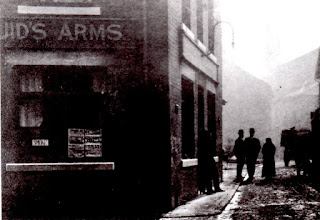The Druids Arms pictured in 1908.
The chimney of Queens Foundry can just about be seen in the distance.
The Druids Arms on Back Spring
Gardens dated as a pub to around the middle of the nineteenth century though
the building itself was older. It was a private house belonging to Robert
Walsh, a local councillor and staunch teetotaller who was strongly opposed to
the sale of any alcohol. However, in 1860 it was bought by John Walsh who then
rented it out to William Ainsworth. Ainsworth paid the required 2 guineas to
the local licensing authorities to open up a beer house.
Back Spring Gardens now only runs from
Ashburner Street to the car park outside Elizabeth House, but in the middle of
the nineteenth century both Spring Gardens and Back Spring Gardens ran from
Deansgate, at its junction with Howell Croft, to Great Moor Street.
The Druids Arms had a reputation for
being one of Bolton’s roughest pubs. In March 1869, James Bridge, a riveter
from Liverpool, was found – quite literally – with his hand in the till. The
wife of landlord William Ainsworth was passing from the bar parlour into the
bar when she saw Bridge lean over the par and put his hand into the till. She
caught hold of him and he dropped 6 ½ d (about 3p) in coins. He claimed to be
drunk but he was sent to prison for 14 days. [1]
When Bolton’s beerhouses had to
re-apply for their licences later that year William Ainsworth was the first to
appear in front of the magistrates. Chief Constable Beech called Police
Constable Dearden to give evidence against the renewal of the licence. PC
Dearden claimed he had seen thieves and prostitutes in the vault of the Druids
Arms not once but on many occasions. He could not name any of the thieves, but
one of the prostitutes was named Mary Tong. However, he didn’t make any file
note of his observations claiming instead that he told magistrates when they
undertook a tour of the premises before the hearing. PC Greenhalgh, who often
worked in tandem with PC Dearden, said he had seen prostitutes at the Druid
Arms, but only in the vault. They were never disorderly and Mr Ainsworth never
refused to throw out anyone who was disorderly. But under cross-examination he
admitted seeing prostitutes in every vault on Deansgate and Bradshawgate. The
magistrates granted Mr Ainsworth his licence. [2]
By 1876, William Ainsworth was at
the Derby Hotel on Chorley Street and Mark Wilcox was at the Druids Arms. Mr
Wilcox was a former stonemason who moved into the pub trade the previous year.
His wife was a member of the Walsh family who owned the building. The Wilcoxes
lasted about a decade and were succeeded by an Irishman, John O’Connor, along
with his Bolton-born wife Catherine. John was a former labourer from Blackhorse
Street. They were in turn succeeded by Sarah Mason who moved from the Anglers
Home on nearby Queen Street.
In June 1908, a customer at the
Druids Arms was the subject of a robbery. William Mather, a collier from
Tyldesley left the pub and met Mary Briggs. As they walked along Barn Street –
the small thoroughfare that still runs from Queen Street to Blackhorse Street
to the rear of the job centre – they were met by two men, John William Rigby
and Bernard Colgan. Mather had shown Briggs a half-crown coin plus 2 shillings
and 6 pence in change - 5 shillings in total and the equivalent of around £25
today. Rigby and Colgan asked Mather if he had any money. Briggs shouted that
he had plenty and the two men set about Mather. Mather shouted for help and the police and two
members of the public arrived. Rigby, Colgan and Briggs were arrested and although
the half-crown coin was missing they were charged with the theft of 2 shillings
and 6 pence. All three were found guilty at Manchester Assizes. Briggs and
Rigby were both sent to jail for 12 months. Colgan was sent to six months in
jail but in addition he was given 12 strokes of the ‘cat-o’-nine-tails’. [3]
The Druids Arms was owned by J
Atkinson and Sons’ Commission Street brewery in the 1890s. By 1910, when it
closed down, it was owned by the Cornbook Brewery of Manchester. The building became
a private residence before being demolished in the late-1920s. The Civic Centre
was built on the site and the bottom end of Back Spring Gardens contained the
building which, for many years, was the central police station.
[1] Bolton Evening News, 25 March
1869.
[2] Bolton Evening News, 1
September 1869.
[3] Manchester Courier, 4 July
1908.

No comments:
Post a Comment